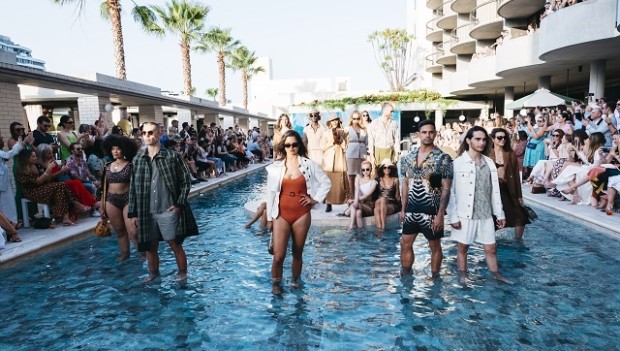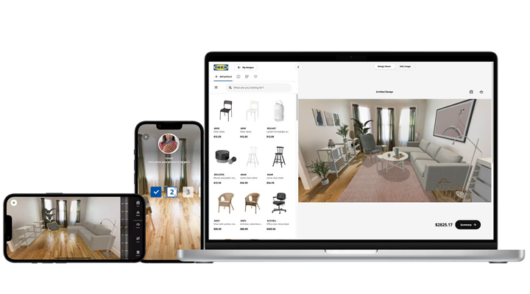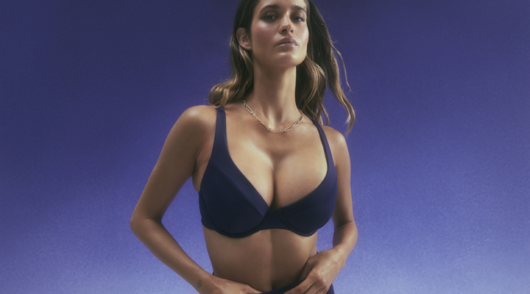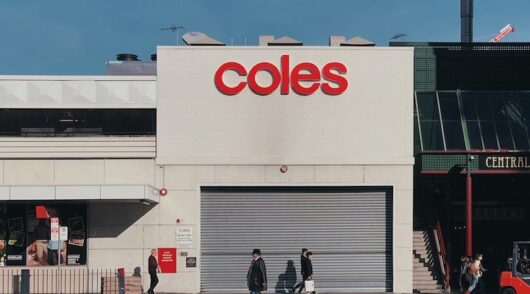
When it comes to diversity, ethics and sustainability, some businesses pay lip service, but at The Iconic, they’re talking the talk and walking the walk. CEO Erica Berchtold discusses driving industry change, thinking outside the box and getting closer to the customer.
During the recent bushfires, The Iconic really decided to throw a lot of support behind the affected communities.
EB: Really, how could you not get involved when you see our country burning and what it does to communities and people? You just want to find a way that you can get involved, so we joined the ‘All In’ campaign spearheaded by Sacha [Laing, CEO at General Pants].
Then we thought that people need more than just immediate financial assistance. We’re really great at storing inventory, moving inventory and processing it – that’s a skillset that a non-profit would find really helpful and useful. It almost broke our hearts to see that organisations were turning away donations because they couldn’t handle them. In a month’s time, people will still need stuff, so we decided to step in and offer storage as a solution. People could directly donate or drop non-perishable items at our warehouse in Yennora or at our Pitt Street office in January.
Then finally, we have a partnership with non-profit Thread Together, which involves us donating product and our team members volunteering their time. Thread Together is activated in these communities to dress people.
We’ve taken a short- and long-term view of how we can help. One thing’s for sure – a lot of these communities have been affected and it’s not going to be something that will take a couple of months to repair. It will be a long, ongoing process of remediation and we’re in it for the long haul.
Broadly speaking, why is it important to you that The Iconic is involved in the community?
EB: We’re talking about customers and our team. Yes, we’re a business, but we’re also an employer, we dress people, we play a role in communities. I don’t think you can just look at yourself as a business anymore, as just a P&L statement. I read an article a while ago how people are looking more to businesses like us to take a stand and drive this sentiment – more so than government sometimes. Government messages sometimes get tied up in political messaging, but we can just say, ‘Here’s what we think, this is our stand and let’s proceed forward under that.’ I think we need to represent something and stand for something and help how we can – and that’s what we’re doing.
What would you say have been some of the highlights for The Iconic in the past year?
EB: We launched our Considered Edit in April before ASOS or Net-a-Porter. It’s a way for people to shop based on their values. We were able to launch it, drive change, then brands ask us to be included. That’s been really great.
There’s our 28,000sqm fulfilment centre out in Yennora [in western Sydney]. We just expanded that recently. We’ve more than doubled inventory capacity. We have the largest fashion distribution centre in Australia and certainly one of the largest in the southern hemisphere and we’re proud of that. We’ve set ourselves up for future growth.
Then there was our annual summer show. It was really amazing to see us championing what it means to be human – that was our message. It’s been described as one of the most representative and inclusive runways. I was so proud to be there and see it. Then at the show, we actually held a roundtable which all our brands and media could attend and we released our inaugural progress report. That documents our efforts and commitments to social, environmental and cultural responsibilities.
A lot of people said to us, ‘Why did you go out and show yourselves, warts and all, where you’re doing well and where you’re not?’ It’s because we live by the mantra ‘progress not perfection’. You have to be honest and open and hold yourself accountable.
I’ve been here nearly a year now and I joined The Iconic because it’s a disruptor in retail and I felt like I was disrupting my career by joining it [Berchtold was previously managing director at Rebel Sport]. Now I get to play in retail but under a different banner.
Not only do I think my time here is making me a better businessperson, but truly, a better human, because I’m surrounded by all these wonderful, like-minded people and I get so inspired by these causes. It’s not that I didn’t have passionate beliefs about these things before, but I’m now able to clearly articulate them and have this unified consistent approach to progression. I really feel like I’m a better person for it, I’m proud of who it will make me and that I can use my voice to drive further change.
Tell me about the progress report.
EB: One of the primary drivers for us in launching The Iconic’s first Annual Progress Report was to hold ourselves accountable and encourage others in the industry to do the same. If you wait to be perfect, things will never get off the ground and start improving. Our ‘progress over perfection’ mantra, empowers us to be ourselves, put our stake in the ground and head towards it.
Our report covers the four key pillars where we want to drive change within our own operations:
- Ethical sourcing (social and environmental impacts of our
- supply chain and those of our partner brands);
- Environment (environmental impacts of our own operations);
- Community (our contribution to the social fabric of the world in which we operate); and
- Diversity, inclusion and body positivity (our celebration of our people and our customers across every touchpoint).
How would you describe the current fashion landscape?
EB: We need to be culturally relevant and we need to strongly stand for something. We’ve taken a stand to say that we have an unwavering focus on sustainability, diversity, inclusion; we’re holding ourselves to account and providing customers with complete transparency on what we do and where we want to go. I think we’re the ones who are really driving this.
I think retailers need to focus on customer experience and stop talking about channels so much. A customer doesn’t say, ‘I’m shopping bricks-and-mortar or online’, so let’s just focus on the customer journey and experience. You can’t afford to be complacent when you’re trying to drive an exceptional customer experience, we can’t be half-arsed in our initiatives. We don’t want to talk about physical versus online – it’s distracting, I think.
The biggest message I always have for myself personally and The Iconic is that we’re not satisfied just giving people what they want. We want to also provide what they don’t yet know they want. We’re staying nimble, focused on where the trends are going, steering them into exciting directions and we’ll keep inspiring and dazzling them.
I think we’re playing a big role in that space. There is a need to evolve the focus on customers and individuals. You can’t just have a mass market, one-size-fits-all approach anymore. Personalisation is key and it’s not about just the marketing message the customer gets, it’s the range you curate for them, the delivery options the customer may want, the brand mix we represent, the features we show. Some might like to follow brands, where you can create your own Instagram feed of your favourite brands with us. Others might be more about wish-listing things and creating boards like Pinterest and sharing them. We’ve got to dial those things up and down depending on what the customer wants.
That goes back to a key piece of work we’ve been doing, which is rebuilding our customer profiles and looking at the specific profiles that we already have, the ones we don’t have yet, who’s the broader market opportunity, then building those assortment plans, delivery experiences and product features specifically to those customer sets.
If I look at fashion retail locally and internationally, I think the European markets, particularly online, they’re more mature than here, but that doesn’t mean advanced. I think we actually are leading the way in a lot of things, like social and environmental responsibility and our sustainability strategy.
We are part of the Global Fashion Group, a broader company, where we have other aspirations and we want to dial it up. We actually all share great ideas among each other between the businesses – there’s The Iconic, Zalora in Southeast Asia, Dafiti in South America, Lamoda in Russia. Collectively, we are delivering a great experience to people globally. But down here in Australia, we’re really at the forefront of fashion globally as well.
What does diversity mean to you?
EB: Customers are at the heart of everything we do and we need to deliver something that’s relevant and help them celebrate their uniqueness. It’s not just gender. It’s age, size, ethnicity, religion, abilities, sexuality – it’s all those things and it’s about the product assortment, the message we deliver and the things we stand for.
We’ll use diverse models and encourage brands to increase size ranges. We need to live those values and even from a team member perspective, it needs to be presented because our team is diverse in terms of ethnicities, age, gender, nationalities and religion. I see our team members being reflective of our customers as well.
Ten years ago, I worked for the Specialty Fashion Group and one of the brands was Autograph. I don’t feel like Australian retail has made progress in the plus-size space since then. At The Iconic, we’re going to try driving a lot of that and give brands encouragement to develop products because we’ll back it. After all, they don’t want to build products if a retailer won’t buy their ranges.
But as a retailer, you can’t just buy a range and expect that the customers will come. You need to live and breathe that whole proposition. We had our diverse runway and we want to be personalised for different customer sets, show them different ranges and make them feel comfortable with our business and what we stand for. If we can give brands the confidence to step into the space more and say we’re committed and stock their products and range it, it will help drive change.
More people are talking about adaptive fashion for people with disabilities these days.
EB: It’s like brands were afraid of niche opportunities because unless it became mainstream, they weren’t keen to focus on it. The Tommy Hilfiger Adaptive range is amazing and it’s really exciting to see them do it. It’s not sexy enough for people to want to talk about it, but we’re going to talk about it and with these brands, we can collectively progress in this space.
I feel a bit embarrassed that I was so ignorant. I just didn’t know that it was such a big issue and it really is – so I’m glad I’ve been educated and I intend to be educated more.
I really love the fact that a person with a disability can actually wear The Iconic and not have to modify it themselves. The challenge is having a nicely designed fashionable product for them. Then it’s about how wide the ranges are and the pricing will probably be something people will focus on – do we need to develop some affordable product in this space as well? That might be something that we start looking into as well. It has to be cost-effective for customers.
What are some of the unique things that adaptive fashion features?
EB: It might be zips that you can open and close with one hand. Or stud buttons. They’re things that will make it easier for people to dress, feel comfortable in and get changed. It’s all those very physical things that a lot of other people don’t naturally realise. I hadn’t thought about opening and closing a zip with one hand and other things that we take for granted if we don’t have those challenges ourselves.
Modest fashion is another focus for The Iconic in 2020.
EB: We have Zalora in Southeast Asia and that does an amazing job in this space. I really love some of the product they’ve developed. Modest fashion isn’t just about religion, it’s about your fashion taste. Not everyone wants to wear the same thing or revealing clothes.
I think it’s important for some of our customers and diversity in terms of body shape, religion and ethnicity, too.
Your past experience is in physical retail. Do you see The Iconic investing more in that space in
the future?
EB: We already do have some physical touchpoints at festivals and we do a lot of experiential things, like The Iconic laundromat at Falls Festival in Byron Bay. We set up an old-school laundromat where you had to crawl through a front loader to get to a secret rave party with DJ sets. We won a global award for that activation. We do a lot of stuff like that.
Our Russian sister brand Lamoda has got a few small shops with counters and four changing rooms, where you can get your parcel sent to them, try your clothes on, then either keep it or send it back. I’m interested in that, so I’m going to Europe and take a detour via our Rusisan business and take a stickybeak so we can learn from them.
I don’t think we need to open a department store, but we do stand for thinking outside of the box. And we’re a disruptor, so there’s stuff we could do that would be amazing for customers, whether you call it bricks-and-mortar or whatever. I think we’ll try some cool stuff this year.





